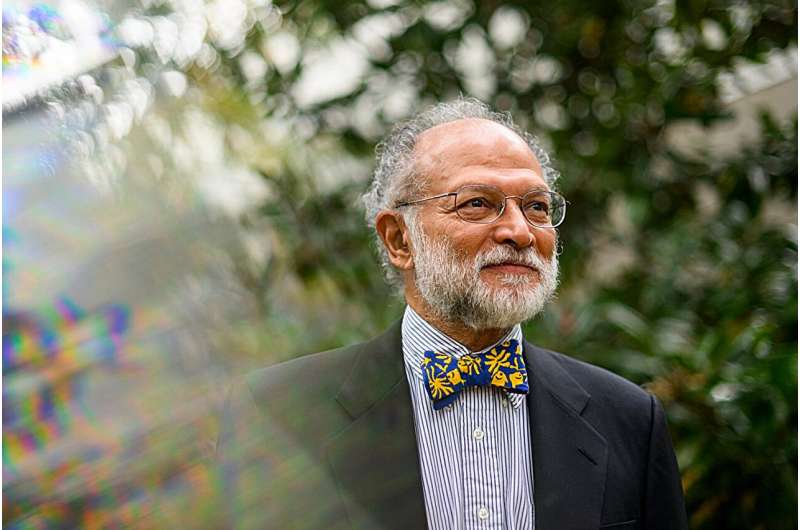
Former President Donald Trump is making a push to appeal to so-called “crypto” voters this election cycle, promising to unveil a plan that would turn the U.S. into the “crypto capital of the planet.”
Far from dabbling in the digital assets space, Trump has made cryptocurrency a large part of his campaign. He recently unveiled the latest additions to his NFT trading cards, and he and his sons have been intimately involved in various cryptocurrency projects.
Even Vice President Kamala Harris, the Democratic nominee for president, has signaled that she would back initiatives to help grow the industry—part of a broader intra-party break from hardline skeptics such as Sen. Elizabeth Warren and reluctant critics such as Securities and Exchange Commission Chair Gary Gensler.
But do “crypto” enthusiasts actually make up a significant voting bloc such that they could help decide who wins in November?
Ravi Sarathy, Northeastern University professor of international business and strategy and author of “Enterprise Strategy for Blockchain,” says that regulators have been softening their position on cryptocurrencies of late, which might lead more Americans on both sides of the political spectrum to dabble in digital currencies.
In theory, that would create a larger constituency of voters with a shared interest around decentralized finance.
Most people who invest in cryptocurrency are adults under the age of 40, but not all investors are of voting age, Sarathy says. Legally, teenagers can invest in cryptocurrency, but most exchanges require that users be at least 18 years of age.

“Both Republicans and Democrats own crypto, and so the question becomes what kind of attitudes lead investors or speculators to dabble in digital currency,” Sarathy says.
The industry is still in its nascency. Sarathy says that for a “healthy, blockchain-based tokenized economy” to exist, further regulatory clarity about digital investments is needed.
Coinbase, the American cryptocurrency trading exchange, recently suggested that young, tech savvy cryptocurrency voters could swing the 2024 election.
“Any candidate that wants to win in 2024, especially those running in the battleground states that can make or break federal elections, must account for the young, pro-crypto constituency,” the article states.
Because of the inherent volatility associated with digital assets, many traditional investors remain wary of cryptocurrencies.
But recent regulatory changes have helped pave the way for more people to invest in cryptocurrencies. The Securities and Exchange Commission recently greenlit about a dozen exchange-traded funds (ETFs) in bitcoin, the first cryptocurrency, and several more in Ethereum, a blockchain platform and the second-largest cryptocurrency being traded.
“The amount of people who are now aware of and investing in bitcoin has grown compared to before these ETFs were approved,” Sarathy says. “It’s fair to say that the constituency for bitcoin has grown in size.”
Additionally, new polling suggests that crypto-curious voters are a fairly diverse cohort. Data from Fairleigh Dickinson University shows that about one in every seven voters owns cryptocurrency; and while they are disproportionately young men, “self-identified liberals, moderates, conservatives, progressives and MAGA voters are all about equally likely to say that they own cryptocurrencies,” the poll shows.
A researcher associated with the poll noted that “the ideology underlying crypto is based on distrust of existing power structures, and that makes it a reasonable fit for Trump.” Sarathy says that’s about consistent with the “libertarian ethos”—which he describes as anti-government, pro-individual—that set the cryptocurrency industry in motion in the late 2000s.
“Anything that smacks of regulation is anathema to someone who is a libertarian,” Sarathy says.
Nick Beauchamp, associate professor of political science at Northeastern University, sees things quite different. He is skeptical that crypto voters constitute a meaningful electoral demographic.
“The crypto ‘voting block’ is not voters but donors,” Beauchamp says. “Crypto appears on almost no one’s list of important issues, and most people are either unaware of it, or have rudimentary opinions.”
“However,” he continues, “there are a number of crypto-associated donors who care very much, and these people are the only reason that the campaigns are making crypto statements, and probably the only reason many Republicans and some Democrats like Chuck Schumer are resisting regulation.”
A Public Citizen report found that the cryptocurrency industry contributed $119 million in 2024 in an effort to influence federal elections.
Provided by
Northeastern University
This story is republished courtesy of Northeastern Global News news.northeastern.edu.
Citation:
Do crypto enthusiasts actually make up a significant voting bloc in the US? (2024, September 4)
retrieved 4 September 2024
from https://phys.org/news/2024-09-crypto-enthusiasts-significant-voting-bloc.html
This document is subject to copyright. Apart from any fair dealing for the purpose of private study or research, no
part may be reproduced without the written permission. The content is provided for information purposes only.
